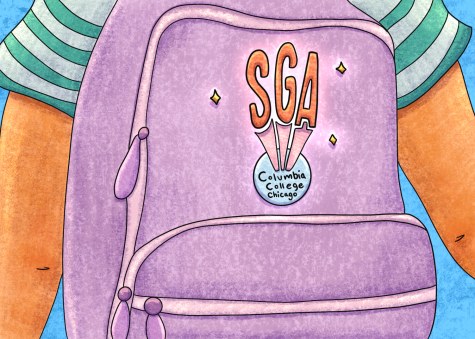SGA’s executive board aims to bring Columbia community together through diversity, advocacy
November 18, 2022

The ideas of advocacy, inclusion and creative initiatives remain at the top of the Student Government Association’s priorities as it approaches the second semester of the 2022-2023 school year.
Two of its biggest priorities are environmental sustainability and better accessibility for students with disabilities.
Tyler Harding, a sophomore in the Cinema and Television Arts Department, is the SGA president and one of four newly elected executive board members for the 2022-2023 academic year.
“I think that everybody who comes to SGA, they come motivated [and] ready to change Columbia for the better,” Harding said. “We’re really here to make Columbia a better place for students to learn and grow.”
Last year, Harding was a senator for the CTVA Department and wanted to address issues he saw beyond his department. Harding campaigned on the initiative to restructure how SGA funds senator-led initiatives through distributing additional funds left over in the budget for the following semester.
Last year, one initiative by SGA was its food pantry in collaboration with ColumbiaCares, resulting in $1,000 of SGA’s budget being allocated to help provide food for students.
Iesha Brown, executive vice president of communications, is new to the executive board this year. She is a senior communication major who hopes to achieve more diversity on campus and within SGA.
“By being one of the people of color in SGA, period, I feel like that creates so many open doors for other minorities and other backgrounds,” Brown said. “There’s so many opportunities at Columbia and everyone should take advantage of that … everything that I’ve done in SGA has really helped me to help someone else.”
Brown started at SGA as a senator for the Communication Department when she was a junior. Responsible for SGA’s social media channels, she hopes the association can increase its outreach and build a greater presence on campus.
“It’s about putting ourselves out there and showing people the actual change that we created and not just showing them that we’re all about change and we’re not doing it,” Brown said.
Elizabeth Barajas Vasquez, a student representative for the Board of Trustees, wants to build a greater sense of community at the college, especially among commuter students.
“We’re in a really special position because you’re a student, working for the students,” said Vasquez, who is a junior English major. “My interest and my passion [in] pursuing advocacy work really came from student government.”
Elected to the executive board this year, Vasquez commutes to campus and said she feels she lost her first two years of the typical college experience due to the COVID-19 pandemic. As a student representative, she hopes to help students who relate to her experience and to help build community groups among underrepresented students on campus.
“What makes Columbia incredible is everyone’s here to be creative and we’re all from different walks of life,” Harding said. “We have an absolutely incredible executive board and I’m so excited for [the rest of] this year together.”







